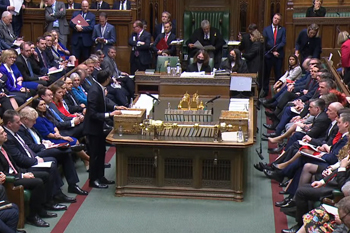Chancellor Rishi Sunak announced a temporary 12-month cut to fuel duty of 5p per litre in his Spring Statement, worth £2.4bn, but was heavily criticised for not going further to ease the cost of living crisis.
With CPI (consumer price index) inflation hitting 6.2% in February - the highest rate for 30 years - all eyes were on the chancellor's actions to ease the financial burden in his announcement to the Commons on Wednesday.

Mr Sunak makes his statement
As he tried to locate the blame for rising prices mainly with the war in UKraine - stating that sanctions against Putin's Russia were 'not without cost' - he made a handful of giveaways in a statement without any radical action.
Of the three immediate measures he set out, the cut in fuel duty was the most ambitious.
He said: 'For only the second time in 20 years, fuel duty will be cut by 5p per litre. The biggest cut to all fuel duty rates ever. It will be in place until March next year. A tax cut this year worth over £5bn it will take effect from 6pm tonight.'
The temporary cut represents a saving worth around £100 for the average car driver, £200 for the average van driver, and £1500 for the average haulier, when compared with uprating fuel duty in 2022-23.
Already widely trailed, fuel duty relief was expected as it serves the double function of reducing costs for drivers and holding down price inflation through reducing business costs.
However, the chancellor was heavily crticised for not going further.
Labour asked 'is that it?' at the end of Mr Sunak's speech, with shadow chancellor Rachel Reeves taking him to task for not imposing a windfall tax on energy companies.
The RAC's head of policy, Nicholas Lyes, argued that it was 'a drop on the ocean' and 'in reality, reducing it by 5p will only take prices back to where they were just over a week ago'.
He also warned there was 'a very real risk retailers could just absorb some or all of the duty cut themselves by not lowering their prices'.
The cost to fill up a petrol car is at over £92 and a diesel at nearly £100 and the Treasury is currently getting 28p a litre VAT on petrol and 30p on diesel, which comes on top of fuel duty.
'Temporarily reducing VAT would have been a more progressive way of helping drivers as the tax is applied at the point the fuel is sold, removing any possibility of retailers taking some of the tax cut themselves to increase their profits,' Mr Lyes argued.
A Confederation of Passenger Transport spokesperson said the cut 'runs the risk though of being perceived as an endorsement of travelling by car at a time when we need to be moving journeys from cars to sustainable transport to stay on track for the country’s net zero goals'.
'Therefore, it’s vital that today’s announcement is matched by the government loudly promoting bus and coach travel and ensuring it delivers on the ambitions of its National Bus Strategy to improve services across the country. This should start by ensuring buses are given priority for road space to make journeys quicker and more reliable to encourage sustainable travel choices.'
Other key announcements include:
- National Insurance starting thresholds will rise to £12,570 from July, worth over £6bn this will benefit almost 30 million working people with a typical employee saving over £330 in the year from July
- the basic rate of income tax will be cut from 20p to 19p from 2024 - a £5bn tax cut worth £175 on average for 30m people and the first cut to the basic rate in 16 years
- an extra £500m for the Household Support Fund, doubling its total to £1bn to support the most vulnerable families with their essentials
- increased the Employment Allowance from £4,000 to £5,000 - this relief allows smaller businesses to reduce their employers National Insurance contributions bills each year
- VAT cut to zero on green technology used to decarbonise buildings, including solar panels, batteries, and eligible heat networks
Register now for full access
Register just once to get unrestricted, real-time coverage of the issues and challenges facing UK transport and highways engineers.
Full website content includes the latest news, exclusive commentary from leading industry figures and detailed topical analysis of the highways, transportation, environment and place-shaping sectors.
Use the link below to register your details for full, free access.
Already a registered? Login